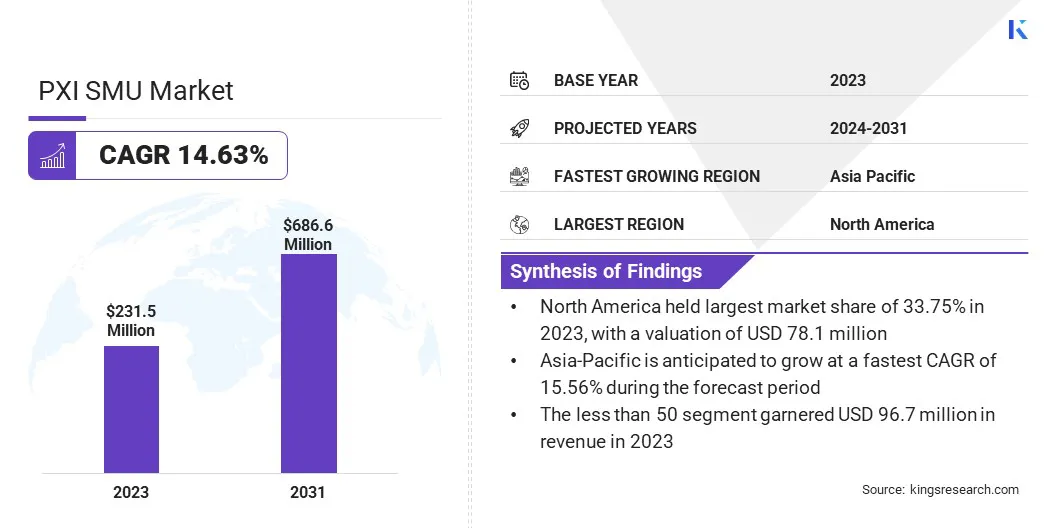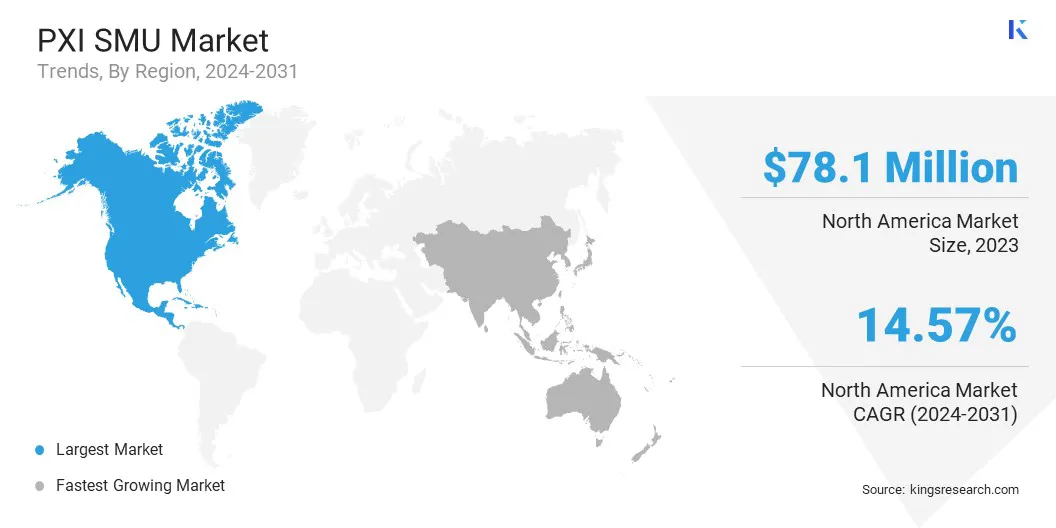Market Definition
The PXI SMU market involves the design, development, and use of advanced modular instruments that combine the capabilities of both a power supply and a measurement unit in a single device.
PXI SMUs deliver precise control of voltage, current, and resistance, while simultaneously measuring electrical parameters with high accuracy. PXI SMUs are widely used for testing, characterization, and validation of electronic components and systems.
Their efficiency, flexibility, and scalability within PXI-based test platforms make them critical in providing precise control of voltage, current, and resistance while also enabling accurate measurements of electrical parameters.
PXI SMU Market Overview
The global PXI SMU market size was valued at USD 231.5 million in 2023 and is projected to grow from USD 264.0 million in 2024 to USD 686.6 million by 2031, exhibiting a CAGR of 14.63% during the forecast period.
This growth is fueled by the increasing demand for high-precision, modular test systems across various industries, such as semiconductor, automotive, telecommunications, aerospace, and renewable energy.
Adoption of PXI SMUs is accelerating due to the need for automated testing solutions capable of handling the growing complexity of electronic devices. PXI SMUs offer precise control and measurement of electrical parameters, making them ideal for advanced applications in both R&D and production environments.
Major companies operating in the global PXI SMU industry are Keysight Technologies, NATIONAL INSTRUMENTS CORP, Acquitek, VX Instruments GmbH, Chroma ATE Inc., Yotta Volt, Marvin Test Solutions, Inc., ADLINK Technology Inc., LitePoint, A Teradyne Company, Kumpulan Abex Sdn. Bhd, and Wuhan PRECISE Instrument Co., Ltd
The rise of electric vehicles (EVs), expansion of 5G networks, and advancements in power electronics are expected to further fuel market expansion. The scalability, flexibility, and high-performance capabilities of PXI-based instruments make them a preferred choice for companies seeking to improve test accuracy and efficiency.

Key Highlights
- The global PXI SMU market size was recorded at USD 231.5 million in 2023.
- The market is projected to grow at a CAGR of 14.63% from 2024 to 2031.
- North America held a market share of 33.75% in 2023, with a valuation of USD 78.1 million.
- The less than 50 segment garnered USD 96.7 million in revenue in 2023.
- The semiconductor segment is expected to reach USD 184.1 million by 2031.
- The aerospace & defense is anticipated to witness fastest CAGR of 15.19% during the forecast period
- The market in Asia Pacific is anticipated to grow at a CAGR of 15.56% during the forecast period.
Market Driver
"Increasing Demand for High-Precision Testing"
The increasing demand for high-precision testing is significantly driving the PXI SMU market. As industries such as semiconductor, aerospace, automotive, and telecommunications advance technologically, the need for precise control of voltage, current, and resistance continues to rise. PXI SMUs are designed to meet these precise demands by providing accurate, repeatable measurements within a modular, scalable test platform.
Aditionally Their ability to combine multiple functions in a single unit also reduces space, cost, and complexity in test systems. As a result, more companies are adopting PXI SMUs to improve testing efficiency and maintain high quality standards, in turn driving the growth of the market.
Market Challenge
"Technological Complexity and Rapid Advancements"
The PXI Source Measure Unit (SMU) market faces a significant challenge due to increasing technological complexity and the pace of advancements in end-use industries. The transition to smaller semiconductor process nodes, expansion of electric vehicle production, and deployment of 5G infrastructure require PXI SMUs to deliver higher accuracy, speed, and flexibility.
As devices become smarter and more interconnected, the corresponding testing environments are growing in complexity. This demands PXI SMUs to support advanced capabilities like real-time data analytics, adaptive testing protocols, and integration with AI-driven test automation.
The need for specialized knowledge and training to effectively utilize these evolving systems can create a skills gap, especially in industries or regions where technological adoption is still catching up.
To overcome this challenge, PXI SMU manufacturers must invest in research and development aimed at delivering modular, scalable systems. This involves designing modular and upgradable systems that can easily integrate new capabilities without requiring a complete overhaul.
Regular software updates and collaboration with industry leaders can help ensure that PXI SMUs remain compatible with evolving standards and requirements. Offering training programs and user-friendly interfaces can help address the skills gap, enabling engineers to efficiently operate and adapt to new features.
Market Trend
"Integration with Test Automation and AI"
The integration of test automation and AI with PXI SMUs is a key trend shaping the market. The demand for efficient, accurate, and scalable testing solutions is driving the adoption of AI and machine learning algorithms within PXI SMU systems.
These technologies enable the automation test procedures, real-time analysis of large datasets, and data-driven optimization of test parameters. This integration allows PXI SMUs to adjust to changing test conditions, optimize test parameters, and identify potential anomalies or issues more effectively.
AI-powered automation helps streamline testing processes, reduce human error, and improve testing efficiency. These benefits are particularly valuable in high-throughput environments such as semiconductor testing, automotive electronics, and telecommunications.
PXI SMU Market Report Snapshot
|
Segmentation
|
Details
|
|
By Channel
|
Less than 50, 50-100, Above 100
|
|
By Application
|
Semiconductor, Green Energy, LED, Nanomaterials, Precision Electronics, Others
|
|
By End-User
|
Automotive, Aerospace & Defense, Government, IT & Telecommunications, Others
|
|
By Region
|
North America: U.S., Canada, Mexico
|
|
Europe: France, UK, Spain, Germany, Italy, Russia, Rest of Europe
|
|
Asia-Pacific: China, Japan, India, Australia, ASEAN, South Korea, Rest of Asia-Pacific
|
|
Middle East & Africa: Turkey, UAE, Saudi Arabia, South Africa, Rest of Middle East & Africa
|
|
South America: Brazil, Argentina, Rest of South America
|
Market Segmentation
- By Channel (Less than 50, 50-100, Above 100): The less than 50 segment earned USD 96.7 million in 2023 due to the growing demand for compact, cost-effective PXI SMUs in semiconductor and consumer electronics testing.
- By Application (Semiconductor, Green Energy, LED, Nanomaterials, Precision Electronics, Others): The semiconductor segment held 26.74% of the market in 2023, due to the growing demand for precise testing in chip manufacturing and advanced semiconductor research.
- By End-User (Automotive, Aerospace & Defense, Government, IT & Telecommunications, Others): The automotive segment is projected to reach USD 184.0 million by 2031, owing to the increasing adoption of electric vehicles (EVs) and the growing need for advanced testing in automotive electronics and power systems.
PXI SMU Market Regional Analysis
Based on region, the global market has been classified into North America, Europe, Asia Pacific, Middle East & Africa, and Latin America.

North America PXI SMU market share stood around 33.75% in 2023 in the global market, with a valuation of USD 78.1 million. This dominance is attributed to the region’s strong presence in industries such as semiconductor manufacturing, aerospace, telecommunications, and automotive, all of which rely heavily on precise and efficient testing solutions.
North America benefits from a well-established technological infrastructure, high levels of innovation, and substantial investment in research and development, ssupporting the continued growth of the market.
The PXI SMU industry in Asia-Pacific is expected to grow at a robust CAGR of 15.56% over the forecast period. This growth is fueled by the rapid industrialization and technological advancements in the region.
Countries like China, Japan, and South Korea are leading the adoption of PXI SMUs, primarily due to the booming semiconductor industry, automotive manufacturing, and the rise of renewable energy projects.
The growing demand for high-precision testing in emerging technologies such as 5G, electric vehicles, and IoT devices is further accelerating the market's expansion. Increasing investments in R&D and a large pool of skilled professionals in Asia-Pacific are anticipated to support sustained growth in this market.
Regulatory Frameworks
- The European Union (EU) regulates product safety through the CE marking, ensuring products meet EU safety, health, and environmental standards.
- The International Organization for Standardization (ISO) sets quality management standards through ISO 9001, which ensures that manufacturers meet consistent quality, reliability, and performance standards.
- The International Organization for Standardization (ISO), through the ISO/IEC 17025:2017 standard, ensures testing and calibration laboratories maintain accuracy, reliability, and traceability in their results. It sets guidelines for equipment calibration, measurement methods, and personnel competence.
- The International Electrotechnical Commission (IEC) regulates safety standards for electrical testing equipment through the IEC 61010 series, ensuring devices are safe to use while maintaining performance and accuracy.
- The Federal Communications Commission (FCC) regulates electromagnetic interference (EMI) through its guidelines for radio frequency (RF) devices. Compliance with FCC regulations ensures that electrical testing equipment does not emit harmful levels of RF interference, maintaining safe and reliable operation within the U.S. market.
Competitive Landscape
The PXI SMU market is highly competitive with with key players focusing on technological advancements and product innovation to enhance testing capabilities for semiconductors and other high-performance applications.
As demand for more compact, efficient, and accurate testing solutions grows, manufacturers are prioritizing the development of flexible and modular PXI SMUs, enabling users to tailor systems to specific application requirements.
Significant investments in research and development are being made to incorporate AI-powered automation, enhance data analytics, and address the evolving needs of industries such as semiconductor testing, automotive and telecommunication.
List of Key Companies in PXI SMU Market:
- Keysight Technologies
- NATIONAL INSTRUMENTS CORP
- Acquitek
- VX Instruments GmbH
- Chroma ATE Inc.
- Yotta Volt
- Marvin Test Solutions, Inc.
- ADLINK Technology Inc.
- LitePoint, A Teradyne Company
- Kumpulan Abex Sdn. Bhd
- Wuhan PRECISE Instrument Co., Ltd
Recent Developments (New Product Launch)
- In July 2023, Keysight Technologies, Inc. introduced a new high-density source measure unit (SMU) to accelerate semiconductor characterization. This advanced SMU is designed to provide high-performance electrical measurements in smaller form factors, offering faster and more accurate testing, which is crucial for semiconductor development and testing.


